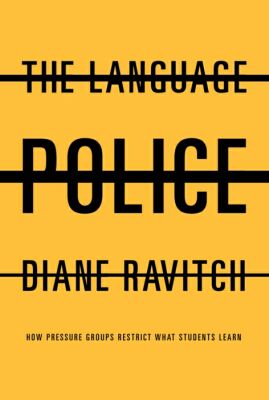

| THE LANGUAGE POLICE How Pressure Groups Restrict What Students Learn Diane Ravitch New York: Alfred A. Knopf, 2003 |
Rating: 5.0 High |
|||
| ISBN-13 978-0-375-41482-4 | ||||
| ISBN-10 0-375-41482-7 | 255pp. | HC | $24.00 | |
College textbooks are selected by the individual professor of each subject at each university. Textbooks for K-12 classes, by contrast, are chosen by a state board for all the public schools in that state. The board therefore controls a huge book market; and because of the economics of publishing, the two most populous states wield the greatest influence over which textbooks get published. Those states are California and Texas, and their clout virtually guarantees that no textbook they reject will be published at all.
Mindful of public opinion, the state boards listen to anyone who challenges their textbook choices. Over the past few decades, tiny but vocal pressure groups have achieved results out of proportion to their size. Political conservatives decry anything that denigrates the Christian religion or the United States, or portrays any kind of disobedience. Liberals tend to blast that which they regard as "politically incorrect" — racism, sexism, ageism, or that which portrays people with disabilities as disabled in any way. Any ethnic or religious group is apt to protest the depiction of its members or their beliefs. And then there is "regional bias" to consider: By its rules, there should be no mention of any particular geographic region of the world (or a specific landmark such as Mount Everest) because some readers will not be familiar with it.1
See, a story about how remarkable it is that a blind person climbs Mount McKinley unhelpfully leaves the biased impression that blind people (sorry, persons) are at a disadvantage with respect to the rest of us. Yes, and siting the story on Mount McKinley puts unacceptable regional bias into it. – Page 10 |
These two factors have combined to give us a generation of textbooks drained — save at the most basic level — of literary merit, scientific accuracy or historical truth. What they do excel at is inoffensiveness garnished with snazzy graphics. Publishers, at first resistant, have knuckled under to the pressure groups. The books they produce may be mediocre, they may be deadly dull and riddled with omissions or even falsehoods; but at least they will be bought. This effective dominance of textbook buying by two major customers has forced publishers to adopt the same restrictive guidelines in order to compete. Many small publishers have been driven out of business. Textbook publishing today is dominated by four houses, only one of which is U.S.-owned.
Diane Ravitch writes from the perspective of a thirty-year career in education. In the administration of George H. W. Bush, she served as assistant secretary in charge of research in the Department of Education. President Clinton appointed her to the National Assessment Governing Board. She is now Research Professor of Education at New York University and Nonresident Senior Fellow2 at the Brookings Institution in Washington, DC. She has authored seven previous books on education, including the critically acclaimed Left Back: A Century of Battles Over School Reform. She lives in Brooklyn.
In this book, she examines the process that has led the textbook publishers to impose their self-censorship. Ravitch cites the often absurd blacklists of words, phrases, nursery rhymes, poems, and stories made up by various protestors (which are happy to release them) and the resulting guidelines adopted by publishers (who generally keep them secret.) As she ably points out, textbooks adhering to such guidelines are less effective at providing the sort of education America's public schools claim to provide. The natural outcome of inferior education is less competent workers and less capable citizens. There are things that can be done about the problem, and Ravitch devotes the last chapter of this well-written book to describing them. Two appendices follow the text. Appendix 1 contains a compilation of the banned words, phrases and images. Appendix 2 is a list of recommended literary works for students, grouped by grade level. End notes, a bibliography, and a good index round out this useful examination of K-12 textbook production.

 To contact Chris Winter, send email to this address.
To contact Chris Winter, send email to this address.